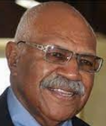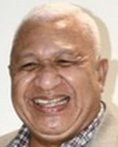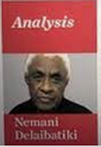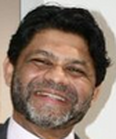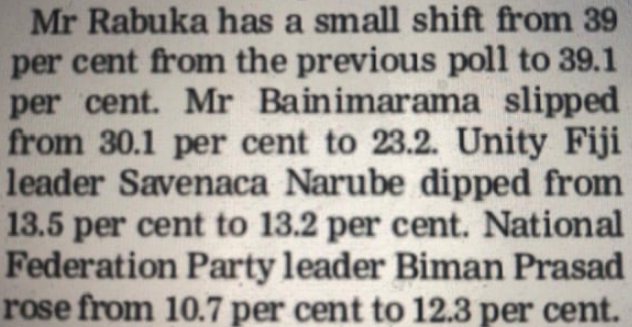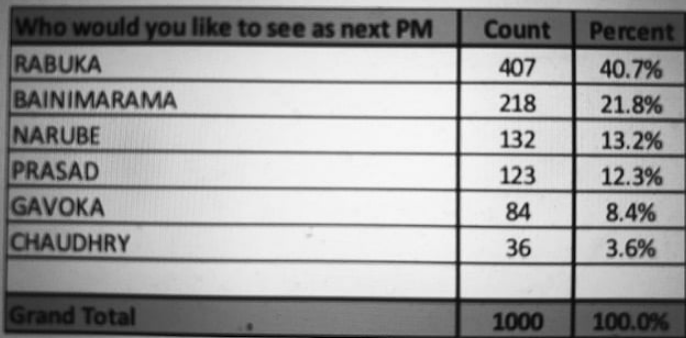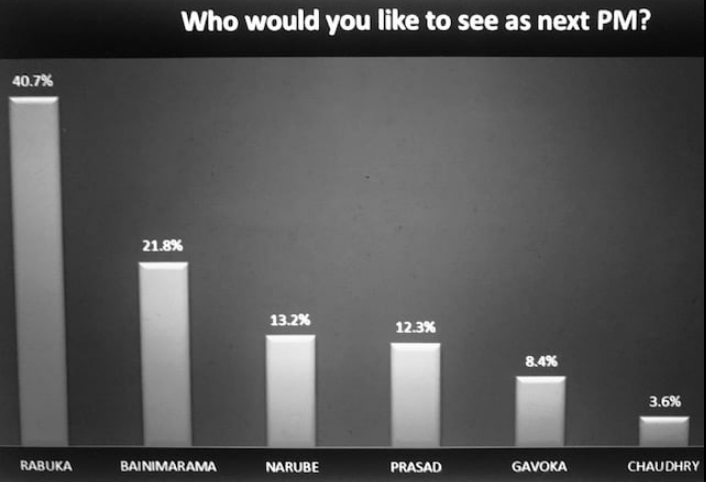Fijileaks: Grubsheet's GRAHAM DAVIS stands by the authenticity of table and graph that was not published by Fiji Sun; paper 'manipulated' stats. The Fiji Sun has not responded to us regarding Graham Davis' claims. |
"This is what [Nemani] Delaibatiki wrote in Monday’s paper: “Mr Rabuka has a small shift from 39 per cent from the previous poll to 39.1 per cent”. FALSE. As our poll extract shows, the actual Western Force findings put the PAP leader’s support at 40.7 per cent.
* And this is what Delaibatiki said about the Prime Minister: “Mr Bainimarama slipped from 30.1 per cent to 23.2”. Again, FALSE. As the extracts we obtained also indicate, the actual Western Force findings show the PM’s support falling to 21.8 per cent. That means that the gap between the two main contenders isn’t 15.9 points as the Fiji Sun falsely portrayed it but 18.9 – a difference of three points.
By GRAHAM DAVIS, Grubsheet
Conclusive proof in the table and graph below that the Fiji Sun tampered with the latest Western Force opinion poll to bolster the poll’s findings on the popularity of the Prime Minister, Frank Bainimarama, and reduce the standing of the People’s Alliance Party leader, Sitiveni Rabuka.
It is a betrayal of public trust that confirms the journalistic corruption at the Fiji Sun that has long been evident in its overt bias in favour of the FijiFirst government and against the opposition. Yet never has that bias been so shameless than with the disclosures Grubsheet is now able to make that clearly warrant wider scrutiny, including being referred to FICAC as a possible breach of the law.
After expressing doubts on Monday about the February Fiji Sun-Western Force poll result and making a public appeal for information, Grubsheet has obtained some of the relevant data. And what it shows is not only an indictment of editorial standards at the Sun but throws a further spotlight, in the election lead-up, on its relationship with the man who ultimately controls the paper's content - Attorney General Aiyaz Sayed Khaiyum.
No blame can be attached to Western Force - a reputable company that would have faithfully provided its findings to the Fiji Sun as part of their ongoing contract. Yet as the evidence demonstrates, at some point between the poll findings being sent to the Sun and them appearing in the paper on Monday, they were altered. Doctored. Tampered with.
In his “analysis” piece on Monday, Sun columnist Nemani Delaibatiki raised our suspicions when he didn’t publish the usual tables and graphs and to use a journalistic expression, "buried the lead" of the real news in the Western Force poll - that Sitiveni Rabuka had increased his winning margin over the Prime Minister and that Frank Bainimarama had again fallen back in the polls. Instead, Delaibatiki led his article with the comparatively minor angle that the SODELPA leader, Viliame Gavoka, had registered an increase in support but this might not be enough to save him from a leadership challenge.
It wasn’t until the penultimate paragraph that Delaibatiki disclosed the startling news that Frank Bainimarama had again registered a dramatic fall in public support, while Sitiveni Rabuka had gone up. The problem is that the numbers Delaibatiki published in the Sun are not the numbers provided to it by Western Force. The veteran columnist and his publisher, Peter Lomas, have some serious explaining to do. Because this is an issue that threatens not only the credibility of the Fiji Sun in the election lead-up but the reputation of its proprietor, the CJ Patel Group, and its publicity-shy young director, Alisha Patel.
This is what Delaibatiki wrote in Monday’s paper: “Mr Rabuka has a small shift from 39 per cent from the previous poll to 39.1 per cent”. FALSE. As our poll extract shows, the actual Western Force findings put the PAP leader’s support at 40.7 per cent.
And this is what Delaibatiki said about the Prime Minister: “Mr Bainimarama slipped from 30.1 per cent to 23.2”. Again, FALSE. As the extracts we obtained also indicate, the actual Western Force findings show the PM’s support falling to 21.8 per cent. That means that the gap between the two main contenders isn’t 15.9 points as the Fiji Sun falsely portrayed it but 18.9 – a difference of three points.
You might wonder why the Sun would risk its credibility by altering the numbers so slightly. That is for them to explain. Perhaps they didn’t want to show Sitiveni Rabuka going over the 40 per cent mark, in other words to have a “4” next to his name rather than a “3”, with the Prime Minister on a “2”. And perhaps they – or the AG - didn’t want to demonstrate such a dramatic fall in the Prime Minister’s standing, that now shows his chief political opponent – the hated “Snake” – to be almost twice as popular and on these figures, in an unassailable position as they continue to move upwards each month towards election day.
While we now know that the Fiji Sun has tampered with the figures in a glaring breach of faith with its readers, was there a wider conspiracy to deprive the Fijian people of the truth? Because we are also entitled to know what role, if any, the Attorney General played in this episode.
As I have said before, I am willing to attest on oath, based on personal experience at his side, that Aiyaz Sayed-Khaiyum controls the Fiji Sun. It is a corrupt relationship and a secret relationship. The AG gives the Sun public money in the form of exclusive government advertising. And in return, the Sun allows him to tell it which stories to cover, which stories not to cover and even provide it with content that the AG dictates to his main contact at the paper - News Editor Jyoti Pratibha. All without the public knowing. Stories and angles are also suggested to Nemani Delaibatiki. So it is no surprise that his article on Monday ended with him describing Aiyaz Sayed-Khaiyum’s performance as Acting Prime Minister as “admirable” when to a great many Fijians, it has been anything but.
Grubsheet can also attest to the fact that in the lead-up to the 2018 election, the AG instructed the Fiji Sun to suppress opinion polling that showed a fall in support for FijiFirst. The Fiji Sun dutifully complied with this order. So it already has form when it comes to allowing its independence to be violated. It was a folly of the first order for the Sun and its patron. Because one of the central tenets of democratic politics is that if defeat is in the offing, politicians need to be frank and encourage their supporters to make a special effort and turn out to vote. In the event, wet weather deterred many Fijians from voting in 2018. But would more of the government’s supporters have turned out if they had known the truth? Is the AG personally responsible for taking the government to the brink of defeat by securing a mere 50.02 per cent of the vote? Those who know the inside story certainly think so.
So here’s a couple of questions for Aiyaz Sayed-Khaiyum: Did you have any role in encouraging the Fiji Sun to alter the latest opinion poll findings? And while we’re at it, why has there never been any polling on you when we know you have the ambition to succeed Frank Bainimarama as prime minister? Have you given an instruction for there to be no polling on your own popularity? Because if the Fiji Sun was a proper newspaper, it would surely be a journalistic imperative to ask the Fijian people what they think of you and that has never happened.
The clear lesson for Fijian media consumers is that you can’t trust what you read in Fiji Sun. Because if it will tamper with an opinion poll, what else will it do to bastardise the flow of information in the government’s favour in the election lead-up?
In any other democracy, this would be a matter for investigation by a media or corruption watchdog – public money given to a media organisation in the form of an exclusive advertising contract and in return, slavish coverage of the ruling party. But Fiji being Fiji, the Media Authority is toothless and defunct and FICAC’s role is to pursue the opposition, not the FijiFirst government or its lackeys at the Fiji Sun.
The only silver lining in this lamentable episode is that the Fiji Times is poised to resurrect the Tebbutt poll and provide us with an alternative source on what the nation thinks about the performance of our political leaders. Because for all the hard work of Western Force personnel on the ground asking the questions, the existing poll is worthless so long as its client, the Fiji Sun, tampers with the results.
Conclusive proof in the table and graph below that the Fiji Sun tampered with the latest Western Force opinion poll to bolster the poll’s findings on the popularity of the Prime Minister, Frank Bainimarama, and reduce the standing of the People’s Alliance Party leader, Sitiveni Rabuka.
It is a betrayal of public trust that confirms the journalistic corruption at the Fiji Sun that has long been evident in its overt bias in favour of the FijiFirst government and against the opposition. Yet never has that bias been so shameless than with the disclosures Grubsheet is now able to make that clearly warrant wider scrutiny, including being referred to FICAC as a possible breach of the law.
After expressing doubts on Monday about the February Fiji Sun-Western Force poll result and making a public appeal for information, Grubsheet has obtained some of the relevant data. And what it shows is not only an indictment of editorial standards at the Sun but throws a further spotlight, in the election lead-up, on its relationship with the man who ultimately controls the paper's content - Attorney General Aiyaz Sayed Khaiyum.
No blame can be attached to Western Force - a reputable company that would have faithfully provided its findings to the Fiji Sun as part of their ongoing contract. Yet as the evidence demonstrates, at some point between the poll findings being sent to the Sun and them appearing in the paper on Monday, they were altered. Doctored. Tampered with.
In his “analysis” piece on Monday, Sun columnist Nemani Delaibatiki raised our suspicions when he didn’t publish the usual tables and graphs and to use a journalistic expression, "buried the lead" of the real news in the Western Force poll - that Sitiveni Rabuka had increased his winning margin over the Prime Minister and that Frank Bainimarama had again fallen back in the polls. Instead, Delaibatiki led his article with the comparatively minor angle that the SODELPA leader, Viliame Gavoka, had registered an increase in support but this might not be enough to save him from a leadership challenge.
It wasn’t until the penultimate paragraph that Delaibatiki disclosed the startling news that Frank Bainimarama had again registered a dramatic fall in public support, while Sitiveni Rabuka had gone up. The problem is that the numbers Delaibatiki published in the Sun are not the numbers provided to it by Western Force. The veteran columnist and his publisher, Peter Lomas, have some serious explaining to do. Because this is an issue that threatens not only the credibility of the Fiji Sun in the election lead-up but the reputation of its proprietor, the CJ Patel Group, and its publicity-shy young director, Alisha Patel.
This is what Delaibatiki wrote in Monday’s paper: “Mr Rabuka has a small shift from 39 per cent from the previous poll to 39.1 per cent”. FALSE. As our poll extract shows, the actual Western Force findings put the PAP leader’s support at 40.7 per cent.
And this is what Delaibatiki said about the Prime Minister: “Mr Bainimarama slipped from 30.1 per cent to 23.2”. Again, FALSE. As the extracts we obtained also indicate, the actual Western Force findings show the PM’s support falling to 21.8 per cent. That means that the gap between the two main contenders isn’t 15.9 points as the Fiji Sun falsely portrayed it but 18.9 – a difference of three points.
You might wonder why the Sun would risk its credibility by altering the numbers so slightly. That is for them to explain. Perhaps they didn’t want to show Sitiveni Rabuka going over the 40 per cent mark, in other words to have a “4” next to his name rather than a “3”, with the Prime Minister on a “2”. And perhaps they – or the AG - didn’t want to demonstrate such a dramatic fall in the Prime Minister’s standing, that now shows his chief political opponent – the hated “Snake” – to be almost twice as popular and on these figures, in an unassailable position as they continue to move upwards each month towards election day.
While we now know that the Fiji Sun has tampered with the figures in a glaring breach of faith with its readers, was there a wider conspiracy to deprive the Fijian people of the truth? Because we are also entitled to know what role, if any, the Attorney General played in this episode.
As I have said before, I am willing to attest on oath, based on personal experience at his side, that Aiyaz Sayed-Khaiyum controls the Fiji Sun. It is a corrupt relationship and a secret relationship. The AG gives the Sun public money in the form of exclusive government advertising. And in return, the Sun allows him to tell it which stories to cover, which stories not to cover and even provide it with content that the AG dictates to his main contact at the paper - News Editor Jyoti Pratibha. All without the public knowing. Stories and angles are also suggested to Nemani Delaibatiki. So it is no surprise that his article on Monday ended with him describing Aiyaz Sayed-Khaiyum’s performance as Acting Prime Minister as “admirable” when to a great many Fijians, it has been anything but.
Grubsheet can also attest to the fact that in the lead-up to the 2018 election, the AG instructed the Fiji Sun to suppress opinion polling that showed a fall in support for FijiFirst. The Fiji Sun dutifully complied with this order. So it already has form when it comes to allowing its independence to be violated. It was a folly of the first order for the Sun and its patron. Because one of the central tenets of democratic politics is that if defeat is in the offing, politicians need to be frank and encourage their supporters to make a special effort and turn out to vote. In the event, wet weather deterred many Fijians from voting in 2018. But would more of the government’s supporters have turned out if they had known the truth? Is the AG personally responsible for taking the government to the brink of defeat by securing a mere 50.02 per cent of the vote? Those who know the inside story certainly think so.
So here’s a couple of questions for Aiyaz Sayed-Khaiyum: Did you have any role in encouraging the Fiji Sun to alter the latest opinion poll findings? And while we’re at it, why has there never been any polling on you when we know you have the ambition to succeed Frank Bainimarama as prime minister? Have you given an instruction for there to be no polling on your own popularity? Because if the Fiji Sun was a proper newspaper, it would surely be a journalistic imperative to ask the Fijian people what they think of you and that has never happened.
The clear lesson for Fijian media consumers is that you can’t trust what you read in Fiji Sun. Because if it will tamper with an opinion poll, what else will it do to bastardise the flow of information in the government’s favour in the election lead-up?
In any other democracy, this would be a matter for investigation by a media or corruption watchdog – public money given to a media organisation in the form of an exclusive advertising contract and in return, slavish coverage of the ruling party. But Fiji being Fiji, the Media Authority is toothless and defunct and FICAC’s role is to pursue the opposition, not the FijiFirst government or its lackeys at the Fiji Sun.
The only silver lining in this lamentable episode is that the Fiji Times is poised to resurrect the Tebbutt poll and provide us with an alternative source on what the nation thinks about the performance of our political leaders. Because for all the hard work of Western Force personnel on the ground asking the questions, the existing poll is worthless so long as its client, the Fiji Sun, tampers with the results.
